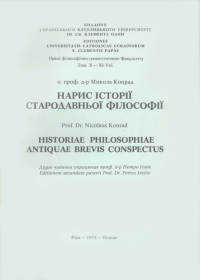Нариси історії стародавньої філософії: Рим, Видання Українського католицького університету ім. Св. Клемента Папи, 1974, 399с.
Ключові слова:
історія філософії, давньогрецька філософія, індійська філософія, китайська філософія, філософія РимуКороткий опис
Книга є другим виданням «Історії» М. Конрада, яку доповнив П. Ісаїв. Зокрема, видання доповнене різними тематичними джерелами, яких не було в оригінальному виданні 1930 року. «Нариси» прояснюють і характеризують поняття історії філософії, а також реконструюють розвиток філософських ідей у Давньому світі. Окрім давньогрецької філософії, якій приділено більшу частину роботи, автор також описує філософські традиції Китаю, Індії, Єгипту, Вавилону та Фінікії.
Зміст
Введення
Вступ
- Поняття філософії
- Значення назви філософії
- Обсяг філософії
- Історія філософії
- Мета історії філософії та користь із неї
- Поділ історії філософії
- Література
ПЕРША ЧАСТИНА
Філософія Далекого і Близького Сходу
І. Китайська (хінська) філософія
- Старокитайська релігія
- Лао-тсе
- Конфуцій
- Дальший розвиток обох систем
ІІ. Індійська філософія
- Веданта
- Санкія (Sankhya) і споріднені системи
- Система «Вайсешіка»
- Буддизм
- Матеріялістичні системи
ІІІ. Медійсько-перська релігійна філософія
Навчання Авести
ІV. Єгипетська філософія
Головні думки релігійної єгипетської філософії
- V. Західно-азійська релігійна філософія
- Вавилонці та асирійці
- Фінікійці
Ведення в докладніші студії проблем з історії філософіїа
а) Бібліографічні доповнення
б) Бібліографія бібліографій філософії
ДРУГА ЧАСТИНА
Перша доба старинної грецької філософії – Предсократівська грецька філософія (VII-V ст. до Христа) – від Талеса до софістів (включно)
- Умовини постання і розвитку філософії греків та римлян
- Предтечі грецьких філософів
- Джерела грецької філософії
- Поділ історії стародавньої грецької філософії
- Література
1.Предмет філософії
- Осередки філософії
- Філософічні групи
- Поділ
- Література
І. Йонські (старші) філософи природи
- Талес
- Анаксімандер
- Анаксімен
- Вплив йонських філософів
ІІ. Пітагорейці
Пітагор
ІІІ. Геракліт
- IV. Елеати
- Ксенофан
- Парменід
- Зенон з Елеї
- Меліссос
- Наслідники елеатів
- V. Молодші філософи природи
- Емпедокл
- Анаксагор
- Атомісти
- Демокріт
- VI. Софісти
- Протагор
- Горгій
- Пізніші софісти
- Значення і наслідки софістичної філософії
ТРЕТЯ ЧАСТИНА
Друга доба старинної грецької філософії – Сократівського аттіцька філософія – Кінець V-го і IV-те ст. до Христа
Вступні завваги
- Характеристика філософії ІІ-гої доби
- Філософи та їх школи
- Література до ІІ-гої доби
І. Сократ
а) Особа Сократа
б) Філософічна діяльність Сократа
в) Наука Сократа
г ) Заввага
ІІ. Менші сократівські школи
Півсократики
- Циніки
- Кіренаїки (гедоністи)
- Мегарійці і елідійці
ІІІ. Більші сократівські школи
1.Платон
а) Особа
б) Твори
в) Навчання
А. Діялектика
Б. Фізика
В. Етика
Г. Оцінка платонізму
- Впливи на платонізм
- Суть платонізму
З. Значення платонізму
- Помилки платонізму
- Школа Платона
- Арістотель
а) Особа
б) Наукова орієнтація
в) Метода
г) Писання
ґ) Переклади творів
д) Поділ філософії
А. Логіка
Б. Теоретична філософія
- Метафізичні погляди
- Космологічні погляди
- Психологічні погляди
- Теологічні погляди
В. Практична філософія
- Етичні погляди
- Суспільні і політичні погляди
- Естетичні погляди
Г. Оцінка арістотелізму
- Паралеля між Платоном і Арістотелем
- Суть арістотелізму
- Значення арістотелізму
- Помилки арістотелізму
- Перипатетівська школа
ЧЕТВЕРТА ЧАСТИНА
Третя і четверта доби стародавньої грецької філософії – Грецько-римська і грецько-східна (синкретична) філософія – III-тє ст. до Христа – VI ст. після Христа
Третя доба
Післяарістотелівська гелленістична філософія
Вступні зауваги
- Характеристика ІІІ-тьої доби
- Поділ філософії
- Література ІІІ-тьої доби
І. Стоїцизм
А. Творці і погляди стоїцизму
Б. Логіка
В. Фізика
Г. Етика
Ґ. Суть стоїцизму
Д. Стоїцька школа
Е. Оцінка стоїцизму
ІІ. Епікуреїзм
А. Творець і погляди епікуреїзму
Б. Каноніка
В. Фізика
Г. Етика
Ґ. Оцінка епікуреїзму
Д. Епікурейська школа
ІІІ. Скептицизм
А. Генеза скептицизму
Б. Пірронізм
В. Середня Академія
Г. Пізніші або новіші скептики – неопірроністи
Ґ. Оцінка скептицизму
- IV. Еклектизм
- V. Філософія в Римі
Четверта доба
Олександрійська філософія
Вступні зауваги
- Олександрія
- Релігійна проблема
- Теософія
- Предмет
- Поділ
- Література
І. Грецько-жидівська релігійна філософія
А. Генеза і творець грецько-жидівської філософії
Б. Погляд філонізму
В. Суть і оцінка філонізму
Г. Вплив і оцінка філонізму
ІІ. Неопітагореїзм
А. Генеза неопетагореїзму
Б. Творці неопетагореїзму
В. Епігони неопетагореїзму
ІІ. Неоплатонізм
А. Генеза неоплатонізму
Б. Творці неоплатонізму
В. Філософія Плотіна
Г. Оцінка неоплатонізму
Ґ. Неоплатонські школи
Д. Вплив неоплатонізму
Е. Неоплатонізм і християнство
Закінчення
Доповнення бібліографії від 1930 р.
Contents




